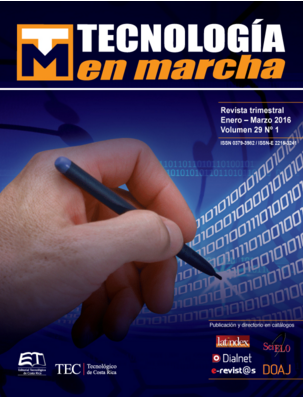Comparative study on the use of two substrates with microbial inoculants for organic solid waste domestic composting: Economic Analysis
Main Article Content
Abstract
A study was conducted to technically and economically evaluate the effects of two substrates in the microbial decomposition of organic household waste (OHW) in a home composting system. With this aim, two different composting inoculates were compared amongst themselves: a microbial preparation of Mountain microorganism (MM), used in the National Centre Specialized on Organic Agriculture in Costa Rica and the Takakura method (TAKA), an inoculate with fermenting microorganisms which is a Japanese technique, developed by the Institute for Global Environmental Strategies (IGES) in Japan. A completely randomized experiment with 20 experimental units was established, divided into five treatments (MM, TAKA), witnesses (TAKAT and MMT) and an absolute control (ABST); each treatment had 4 replications. Organic Household waste (OHW) from 20 households were used, distributed in 7 inputs during 18 days. Results highlight the quality of compost obtained through TAKA substrate in comparison to compost obtained with MM substrate. Regarding the cost analysis, the MM substrate is 7% less expensive than TAKA, these costs do not exceed USD17. Both treatments are inexpensive compared to the current waste management landfills.
Article Details
Los autores conservan los derechos de autor y ceden a la revista el derecho de la primera publicación y pueda editarlo, reproducirlo, distribuirlo, exhibirlo y comunicarlo en el país y en el extranjero mediante medios impresos y electrónicos. Asimismo, asumen el compromiso sobre cualquier litigio o reclamación relacionada con derechos de propiedad intelectual, exonerando de responsabilidad a la Editorial Tecnológica de Costa Rica. Además, se establece que los autores pueden realizar otros acuerdos contractuales independientes y adicionales para la distribución no exclusiva de la versión del artículo publicado en esta revista (p. ej., incluirlo en un repositorio institucional o publicarlo en un libro) siempre que indiquen claramente que el trabajo se publicó por primera vez en esta revista.

